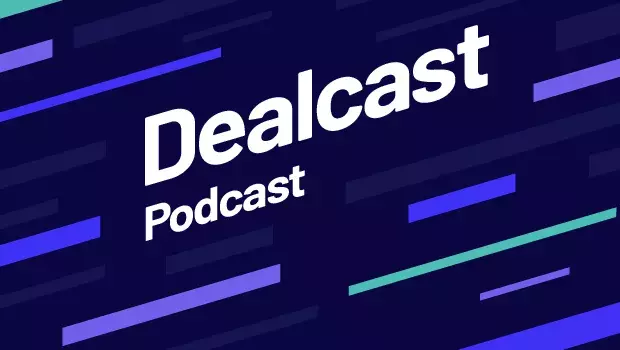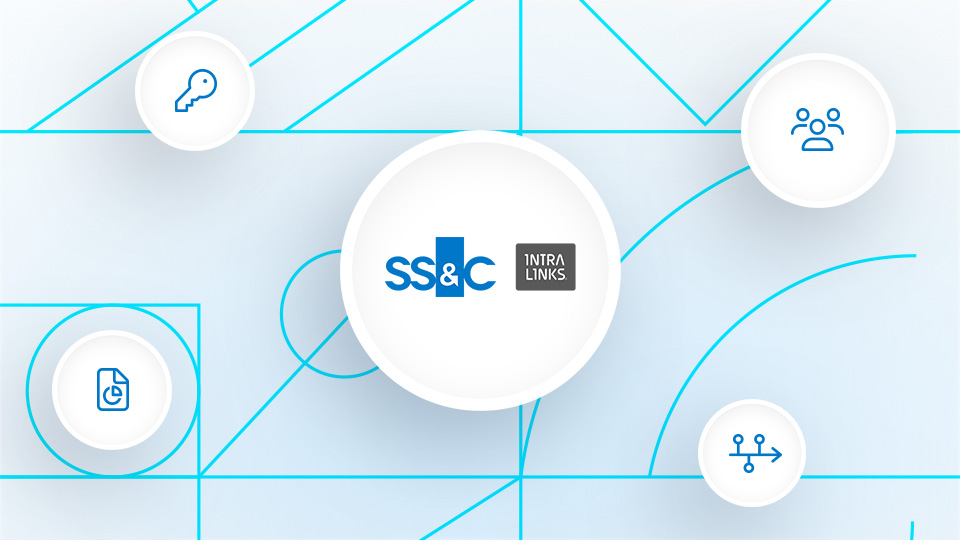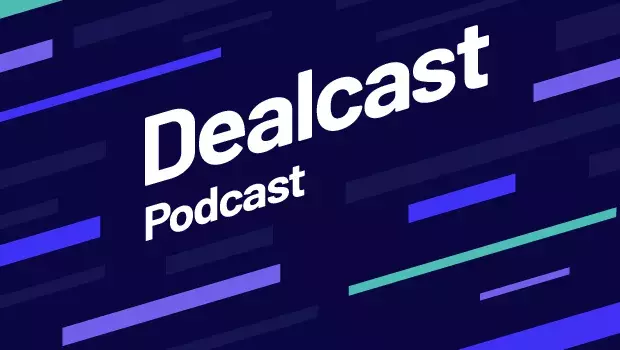IPO Markets Open, But Cautiously
Companies are going public again, but is it all good news? In this week’s episode, we’re talking about IPOs. After booming in 2021, the IPO market went quiet due to macroeconomic pressures and uncertainty. With inflation easing, recent blockbuster debuts by Arm Holdings, Instacart and Birkenstock hint at a glimmer of a comeback. Can this renewed interest sustain itself?
Dealcast is presented by Mergermarket and SS&C Intralinks.
Dealmakers, download the SS&C Intralinks Deal Flow Predictor for Q4 2023 to see our data-driven prediction on where M&A will go globally and regionally in the next six months: https://www.intralinks.com/deal-flow-predictor
*****
Transcript
Julie-Anna (00:05): Hello and welcome to Dealcast, the weekly M&A podcast presented to you by Mergermarket and SS&C Intralinks. I'm Julie-Anna Needham. I'm a business journalist who's been covering M&A for a decade. Today we are talking about IPOs. Now after a quiet few years, it seemed very recently that things had turned a corner with some blockbuster IPOs taking place, including the hotly anticipated listing of chip maker, Arm. But is it all good news? To answer that question, I'm joined by Samuel Kerr who's the ECM editor at ION Analytics. Hi Sam, thanks for joining me today.
Samuel (00:49): Hi Julie-Anna, thanks for having me.
Julie-Anna (00:51): So, IPOs seem to be picking up. Are we finally out of this two-year slump?
Samuel (00:58): Well, we definitely started September hoping so. We had some big talk over the summer about deals to come this autumn and we started off really well. We had a mega IPO in the US in the form of British semiconductor company, Arm, which was a sold by SoftBank, and a couple of other big US IPOs as well. And we've had quite a bit of activity on this side of the Atlantic as well in Europe with three deals launching in September. One, the German glass vial maker, Schott Pharma, priced and seems to have priced very well and we have another two deals expected to price this week and next. So yeah, it does feel like there is some momentum behind the asset class, but there are still some problems. So, I would say we're in green shoots of recovery rather than through the slump.
Julie-Anna (01:49): Okay. And can you go into a bit more detail about what's been going on on both sides of the Atlantic? You've mentioned some of those names including the most hotly anticipated one Arm, but there's also been Instacart in the US, as well.
Samuel (02:03): There has. So Arm was a real blowout deal with 28 banks on the deal. Massive, massive levels of subscription, huge reports in the financial press and the mainstream financial press. Sometimes you can't quite trust those numbers because hedge funds often inflate their orders and IPOs. But there were talks of Arm being 10 times oversubscribed. Instacart as well had a very good book from what we hear and was hotly, in hot demand as well. So, both those deals were considered to be very, very good transactions and traded up well on the first day. It, unfortunately, hasn't seemed to have lasted, which is the issue with those deals. Arm now is only slightly above its IPO price, I mean today, which is the 4th of October. It's just above the 51 where it priced its IPO despite being up 25 percent on the first day.
(02:58): So, we had an initial very large pop there and then it's lost most of those gains since, and it's unfortunately a pretty similar story with Instacart. Both those deals have struggled to maintain the early momentum that they've had, which means that within the IPO market itself, people really went from sort of jubilation around the U.S. deals to a little bit of concern that the market isn't quite as strong as they thought it was. This side of the Atlantic, we've had a big European IPO in the form of Schott Pharma, which is sold by Schott AG. It's their medical glass and vials unit and that does seem to have gone pretty well. It got a lot of demand during book build. All the investors that we spoke to, some of the biggest ones in Europe, were all looking at it and all thought it was a high-quality company.
(03:47): It's a very niche company. It's pretty much one of the few operators in its sector, which is a very high-margin sector. And alongside that we have another couple of interesting deals. We have a French software company Planisware, and then we have a German firm, Renk, which is interesting because it makes, it's mainly a defense contractor, it's a former gearbox division of VW. It was bought by Triton, the sponsor, and now is being IPOed. And it's really, the interest in Renk I think has picked up very much around the war in Ukraine, which has brought that sector really back into the force. And I think if you look at a couple of other European listed stocks like Rheinmetall and Hensoldt, which both operate in that industry. The growth of those stocks since the disaster War of Ukraine shows that there is now a real focus from investors on European defense. So, it's an interesting time definitely, but I think a little bit more fragile unfortunately than we thought it was going to be.
Julie-Anna (04:40): And can we just go back to the U.S. and the listings of Arm and Instacart? What's the reason that those deals have gone down so much since they listed?
Samuel (04:53): Well, one of the big major problems with both deals was the size of the free flow, in my opinion. And it's the opinion I think of quite a few people in the market. There's a very good former banker called Craig Coben who we spoke to, and also writes a regular column in FT, who agrees and I think, the idea around small free floats normally is that you can sell less at a lower valuation and give a little bit to investors, but if you make that free float too small, then it really does hit your liquidity and trading. Trading, sorry. So, Arm really floated less than 10% of the company and quite a lot of the shares went to strategic buyers who aren't really regular traders of stock. So, there was big reports of Apple and Nvidia buying into the IPO that meant that hedge funds and equity investors who are normally your typical IPO book were probably given a lot less than they thought they were going to get. And that meant when Arm rose 25% on day one, it wasn't really a strategic investment for them, and they were there for possibly selling quite early on in that process. And it doesn't take very much selling on a small free float to really hit an IPO price. And IPOs are, unfortunately, always less liquid than other stocks. So, they get hit by general volatility far more.
Julie-Anna (06:11): Particularly if they're only selling 10% of the company.
Samuel (06:15): And you've also got to remember that we had an issue with the Fed on the round September 20th when they came out. They didn't raise interest rates, they kept them way they were, but the Fed came out with a really hawkish message that sort of indicated to the market that interest rates were going to be a lot higher for a lot longer. Now that's not particularly related specifically to Arm's business, but it did hit equities as a whole. And again, when you have less liquidity, you are not as cushioned from these macro events as other stocks. Now Arm is not a complete failure by any means. It's still above IPO price as of early October, but it's certainly not the blowout success that people had hoped it was going to be.
Julie-Anna (06:56): And so, despite issuance increasing, it seems that investors are very selective about what they're investing in. What makes a strong IPO candidate in this market?
Samuel (07:07): Well, you have to be must own. I think that's something that we've said for a while and I wrote a piece this week for our weekly column ECM Pulse, where that was exactly the theme. If you are not an asset where investors absolutely have to buy you, then you have to offer value. Those are really the only two things that you can bring to an investor portfolio. When an investor is looking at a new company and IPO, if you are offering something that they find very difficult to get as a listed exposure already, then the IPO really is the only way that you can get access to that. I mean if you think back to Porsche last year, the only way that you could sort of buy Porsche as a company was to own the stock and there were very few car manufacturers of Porsche's profile that were already listed. You had Ferrari, but that was far more luxury. Then you also had other companies like, for example, Mercedes and BMW, which were far less luxurious. So yeah, Porsche had that really interesting niche middle ground that investors really wanted to own, and it was such a blowout name before it even came to the IPO market that people sort of had to own it or if they weren't going to own it had to have a reason not to own it.
Julie-Anna (08:07): Or own a Porsche.
Samuel (08:08): Which actually a lot of the guys in Germany probably did and I know it had a lot of German interest in that deal. But the thing if you look at Schott Pharma, Schott Pharma, again, it's a very niche sector, but it makes sort of medical vials and sort of stems them all across Europe. Now the only way that you can get that exposure is on listed exchanges already is through a company called Stevanato, which is US listed, so therefore has a very high multiple. So, you are paying a lot for that exposure or there's another company in Europe called Gerresheimer, but that's far less sort of less high margin. So, you can have a company that is sort of wider and broader in Europe, but you don't get that absolute niche exposure that you got in Schott Pharma, or you have to go for a US listed peer.
(08:51): So, Schott had a really nice unique value that people could buy into. Now if you don't have that unique value, you have to be offering a compelling enough valuation for people to turn away from the abilities to buy a listed company which has a strong track record in order to get in on an IPO discount. So, if you can say 'look, we are not as proven as this already listed company, you would do something similar, but hey, we can give you a great discount', then that's another way for people to get into the book. But if you are approaching equity to investors, you just have to have one of those two things. And if you aren't unique but you aren't willing to offer compelling value, then it really leaves you in a position where you're not going to be in an attractive IPO candidate.
Julie-Anna (09:30): Thank you. And there's no escaping it. We are getting to the end of 2023. I saw the Christmas trees being put up where I live yesterday in the town. Can we expect to see any more big deals before the end of the year?
Samuel (09:44): We have one behemoth, potentially, before the end of the year in the form of private equity firm CVC, which is looking at an Amsterdam listing. And CVC has been talked about as an IPO for a really long time, but as we wrote in our piece on Monday, the ECM Pulse, they are taking meetings actively now to possibly look at a launch in October with a pricing maybe in November. Now if CVC comes, that would almost be a Porsche-like name in the European IPO market. It's a massive name in its sector. There has been a bit of an issue with private equity IPOs. Some have not been particularly strong performers. Bridgepoint's IPO hasn't been a huge blowout success while on the counterpoint IPO investors in EQT, which listed a little bit earlier than Bridgepoint have done really well.
(10:31):
So, there is a bit of a mixed equity story around the asset class, but CVC has been focused on for such a long period of time and it has some very interesting investments. It's one of the biggest investors in global sport, which is something that people really want to seem to get exposure to at the moment. It's a huge investor in rugby. I think it's a major partner now in the Six Nations and given the Rugby World Cups going on, it's a great time to possibly do that IPO with that and has had a history in sports as well with Formula 1 before selling that asset. So, CVC I think is a really, really interesting company and it gives people a lot of exposure to some private assets that they wouldn't normally be able to get. And it can use the IPO now to grow itself into this real multi-asset consolidator perhaps in the form of a U.S. firm like KKR. And so, I think that's an attractive enough equity story and a big enough name that people would be interested in that even if we have slightly fragile equity markets
Julie-Anna (11:25): Moving away from IPO specifically, can we talk about the sentiment towards the broader equity capital markets as we head into the last few months of this year, please?
Samuel (11:35): Of course. So it’s, forgive me, sometimes over simplifying, but the equity capital markets really is the same thing that affects equity markets in general. The sentiments on general equity indices is really what's going to be affecting investor appetite to invest in the new issue markets and equity capital markets. And, at the moment, there's a little bit of a cloud over them again, because of what happened with the Fed in September, if you look at now a lot of the indexes that measure investor sentiment, we're getting close to them being into what we call the fear index territory, where people are quite frightened about the long-term direction of equities. I think the message from the Fed that we're not going to get rate rises, sorry, rate cuts until at least perhaps summer of next year, and that's the expectation if you look at all the Fed monitoring tools, has given equity investors a little bit of a pause for thought and I think a lot might be looking at maybe profit taking now into the end of the year. Which means we may have a little bit of a fragile equity market through to the end of 2023.
(12:32): I might be wrong, and things do bounce back very quickly as we've seen in the last couple of years, but I think what it means is there does really have to be a lot of thought about investor sentiment. When you are looking at IPOs, block trades or anything. You're going to have to give investors enough cushion on price in order to make it more of a risk-free investment for them. And again, no investment's ever risk-free, but if you can reduce that risk for them in taking on that position and it's always a substantial position in an equity capital markets transaction, then I think you are going to make investors a lot more comfortable with your deal. Deals will happen, but I think the chance of them happening at the price that sellers want them to happen as, or even closer to a seller price, is probably diminished now by the direction that we're seeing from global Central Banks. And I think we're likely to have possibly a more prolonged period of equity market volatility, which unfortunately does feed through to the equity capital markets.
Julie-Anna (13:24): Great, Sam, good to chat. Thanks very much. That was Samuel Kerr, senior ECM editor at ION Analytics. Thanks for listening to Dealcast presented by Mergermarket and SS&C Intralinks. Please rate, review, and follow the podcast. You'll find us on Apple Podcasts, Spotify, or look out for your Mergermarket news alert. For more information, have a look at our show notes. Join us again next week.




